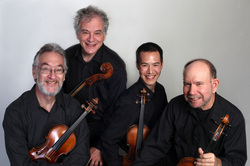
This hall is a nice size for chamber music, but the acoustic is dry. In this unforgiving environment all is laid bare, and it’s possible to hear everything that’s going on inside a string quartet.
The Juilliard Quartet traces its history back to 1946, when the composer William Schuman (who was president of Juilliard at the time) thought it would be a fine thing if the school had a resident string quartet. However, none of the current members of the Juilliard Quartet were there in 1946. The longest-serving member of the group is violist Samuel Rhodes, who’s been playing in the quartet for 42 years. And the newest member is first violinist Joseph Lin, who joined the group last year.
I mention all this because I tend to be suspicious of chamber ensembles that are A] the invention of an institution, and B] have been around so long that they now contain none of their original members.
Both of these situations – and the Juilliard Quartet falls squarely into categories A and B – seem contrary to the ideal spirit of chamber music. Ideally, a chamber ensemble should be a group of self-selected musicians who play well together because of their particular musical and personal affinities. It is a strange thing for a string quartet to be organized something like an orchestra, only smaller.
But if the Juilliard Quartet looks more like the Monkees than the Beatles (if you get my drift), they certainly don’t sound ill-matched or artificial. On the contrary, balance and unity of purpose were consistently strong throughout the concert. And Lin fits very well with the members of the quartet who have been there for years.
The Haydn on the program – his Op. 54 No. 1 – was all charm, with some very delicate and refined playing in the second movement (with tender solos from Lin), and a nice push and pull to the minuet’s tempo.
Donald Martino’s Quartet No. 5 was written in 2004, one year before the composer died – but in its knotty atonal language it was a product of the 20th century. The Juilliards found all kinds of clever ways to infuse the work with detail and character, bringing life to what might have been a pretty dull chunk of music.
In Beethoven’s Quartet Op. 130, the Juilliards rose to the occasion spendidly. Throughout, contrast was underscored – usually to excellent effect (although an exaggerated lilt in the fourth “danza tedesca” movement seemed a tad affected). For me, the highlight of this work was the “Cavatina”: gorgeously lush and homogeneous.
The concert might have ended here with no dishonour to anyone. But the Grosse Fuge beckoned, with its Everest-like challenge: “conquer me or die trying.” The Juilliards conquered – not just by technical prowess or sheer force, but also by eloquent persuasion.
I’m not a man to quickly change my views of the world. So I’ll remain suspicious of chamber groups that are created by institutions. And I still believe that once all the members of a quartet retire, the quartet’s name should also be retired. (If the remaining players wish to continue, they should find a new name for themselves.)
But on Wednesday night, the Juilliard Quartet proved once again that there are exceptions to every rule.
© Colin Eatock 2012
 RSS Feed
RSS Feed

